|
|
|
Sort Order |
|
|
|
Items / Page
|
|
|
|
|
|
|
| Srl | Item |
| 1 |
ID:
134008
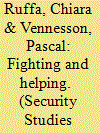

|
|
|
|
|
| Publication |
2014.
|
| Summary/Abstract |
In complex humanitarian emergencies, why are NGO-military relations cooperative in some cases, yet deeply conflictual in others? Drawing on historical-institutionalist theoretical insights, we argue that NGOs and military organizations are embedded in, and responding to, domestic institutional configurations that define a set of political incentives and constraints, material and normative, which structures and influences the characteristics and outcomes of their relations. Counterarguments suggest that organizational differences and the nature of their missions affect NGO-military relations. Using fresh empirical evidence we assess these arguments by comparing the Italian and the French experiences of NGO-military relations during the NATO-led International Security Assistance Force (ISAF) mission in Afghanistan and the UN mission in Lebanon (UNIFIL II) between 2007 and 2011.We find that domestic institutional configurations are not left behind when NGOs and military units deploy abroad. Rather, they shape NGOs' and militaries' capacity to work together instead of at cross purposes and ultimately influence the success of international action.
|
|
|
|
|
|
|
|
|
|
|
|
|
|
|
|
| 2 |
ID:
160627
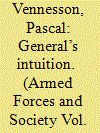

|
|
|
|
|
| Summary/Abstract |
Can we trust the operational intuitions of generals? The proponents of the overconfidence model, one of the most influential perspectives in the psychology of judgment, commonly offer a skeptical answer. Generals’ operational intuitions are likely to be hampered by overconfidence and negatively affect military effectiveness. However, the successful operational outcome of General Douglas MacArthur’s decision to land at Inchon (June–September 1950) seemingly contradicts the model. We seek to complement and refine the overconfidence model by examining the Inchon landing decision through the analytical lens of the recognition-primed decision model. This model typically envisions that under specific circumstances—notably an experienced decision maker, an adequate environment regularity, and an opportunity to learn—generals are able to make quick and satisfactory decisions. We show that such a configuration was present in the Inchon landing case and helps explain both the decision process and its successful outcome.
|
|
|
|
|
|
|
|
|
|
|
|
|
|
|
|
| 3 |
ID:
153044
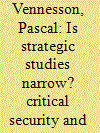

|
|
|
|
|
| Summary/Abstract |
Critical security advocates commonly portray strategic studies as crippled by its narrow focus on Cold War-era military issues, as state-centric and as Western-centric. I argue that this conception of the scope of strategy is flawed and I offer a comprehensive rebuttal by working out the logic of the theories advanced by Carl von Clausewitz and Thomas Schelling. The proponents of critical security overlook the striking expansion of strategy during the Cold War, its longstanding inclusion of competing political actors not just states, as well as its capacity to put Western and non-Western actors in a common analytic frame. By breaking out of the conceptual jails in which strategy has been incarcerated, I seek to reconnect International Relations to strategic thought from which it has become increasingly estranged.
|
|
|
|
|
|
|
|
|
|
|
|
|
|
|
|
| 4 |
ID:
088936
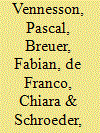

|
|
|
|
|
| Publication |
2009.
|
| Summary/Abstract |
Europe is the region of the world where the network of security institutions is the densest. Yet, these institutions did not erase differences about conceptions of force employment among European countries and between European countries and the United States. Why have concepts of military power and force employment remained distinct and varied in Europe, and yet, what facilitates their convergence at the European Union level into the ambiguous notion of crisis management? We argue that an important answer to these questions is endogenous to the military: both role conceptions and organizational frames of military institutions are key underlying aspects of the differences at the national level and of the common ground at the European Union level. We examine and compare empirically the role conceptions and organizational frames of the armed forces in France, Germany, Italy, and the United Kingdom since the early 1990s
|
|
|
|
|
|
|
|
|
|
|
|
|
|
|
|
| 5 |
ID:
120312
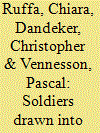

|
|
|
|
|
| Publication |
2013.
|
| Summary/Abstract |
The tactical level has become increasingly important in the conduct of contemporary complex military operations. Yet, the potential impact that this tactical level may have on domestic civil-military relations has been neglected. In this article, we focus on mechanisms by which low-level soldiers have acquired an increasing importance in tactical operations and we suggest that this may influence civil-military relations in the future. We argue that two phenomena deserve particular attention. These mechanisms are not new but they have had new effects by making it possible for soldiers to influence politics in sometimes unforeseen ways: the first is the strategic corporal and the second is the expansion of ancillary tasks. Our contribution lies at the interface between military sociology and security studies and seeks to show how the tactical level of warfare has become a fundamental context in which civil-military relations are enacted. Exploring these dynamics is fundamental to understanding under what conditions soldiers may interact with other actors in complex operations.
|
|
|
|
|
|
|
|
|
|
|
|
|
|
|
|
| 6 |
ID:
131694


|
|
|
|
|
| Publication |
2014.
|
| Summary/Abstract |
'Naming and shaming' those accused of abuse and misconduct is one of the most common strategies of transnational activists. Yet both qualitative and quantitative studies show that the policy and behavioural effects of naming and shaming are often contradictory. Named and shamed actors do respond at least partially by adjusting their policies and behaviour to some extent, but the actions challenged publicly as human rights violations may not cease and can even become more widespread. This ambivalent outcome is usually explained by the uneven capacity of the target to reform or by its 'strategic' response to escape the consequences of naming and shaming. By contrast, I show that naming and shaming can be brought to a standstill when the frame used by transnational activists is ambiguous. I trace the role of framing ambiguity during the Human Rights Watch (HRW) 'naming and shaming' campaigns against the Israel Defence Force (IDF) in the course of the July-August 2006 Israel-Hezbollah war (Lebanon war), and the December 2008-January 2009 Israel-Hamas war (Gaza war). I argue that HRW's use of International Humanitarian Law (IHL) as a frame led to an argumentative deadlock (frame implication contest). This legal frame, and the process of legal framing, did genuinely constrain the IDF, affecting its operations and behaviour. However, the ambiguity of the frame also provided the IDF with a range of material and ideational assets that gave it scope to claim that its actions were actually in conformity with applicable law, and to justify continuing to use force in densely populated areas.
|
|
|
|
|
|
|
|
|
|
|
|
|
|
|
|
|
|
|
|
|